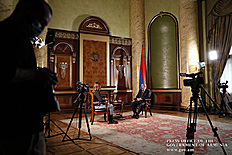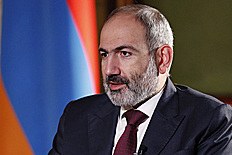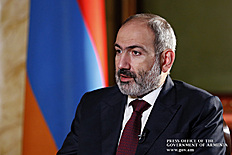Interviews and press conferences
“In this situation, the Karabakh conflict has one solution: the principle of “remedial secession” – Nikol Pashinyan’s Interview to Liberation
Prime Minister Nikol Pashinyan was interviewed by the French Liberation newspaper. Below is the translated version of the interview.
Liberation - Mr. Prime Minister, why did the ceasefire not work?
Prime Minister Nikol Pashinyan - Azerbaijan declined the ceasefire as a matter of fact, even though a relevant statement had been adopted jointly with Armenia. It was obvious that Turkey would not allow Azerbaijan to respect the agreement. During the negotiations over the ceasefire agreement, the Turkish President declared that they did not want Azerbaijan to halt the fighting. This conflict would not have started without Turkey’s intervention. It was Turkey that encouraged Azerbaijan to attack Artsakh. Turkish troops were engaged and are participating in the attacks
The command is made up of top Turkish officers. It was Turkey that transported mercenaries and terrorists from Syria to the Nagorno-Karabakh conflict zone and used them during the offensives.
It is not a coincidence. All this must be seen in a context where Turkey is trying to impose itself in the Mediterranean, in Syria, Iraq, Libya, and in a certain way, in Greece and Cyprus. It is an imperialistic policy.
Turkey is back to the South Caucasus to complete its genocidal policy against the Armenians. This is intended to fulfill a specific objective since the Armenians are the last barrier on their way to north, east and south.
Liberation - Your Defense Ministry spokeswoman Shushan Stepanian said on October 9, 2020 that the Nagorno-Karabakh army had “enough military targets near the frontline.” What was the reason behind targeting Ganja in Azerbaijan during the ceasefire, at the risk of hitting civilians?
Prime Minister Nikol Pashinyan - You say “during the ceasefire,” but there has never been a ceasefire. On the contrary, Stepanakert and other settlements were bombed twice as heavily from the moment the truce was negotiated. In any case, even the statements issued by the Presidents of Minsk Group-member countries were not able to stop the rocket-borne attacks on civilian buildings, houses, towns. The Nagorno-Karabakh army therefore decided to respond. After that the shelling of Stepanakert stopped, at least during the days that followed.
Liberation - Is that why you recently called for volunteers to join the front?
Prime Minister Nikol Pashinyan - Yes, this is not just a political war. It is an attempted genocide of the Armenian people. We must defend ourselves, like any nation that is threatened with extermination. Especially now as we see that there is only one way out of the conflict: the principle of “remedial secession.” There is no other possibility. Otherwise the Armenians will undergo ethnic cleansing in the areas controlled by Azerbaijan.
Liberation - What do you expect from Russia?
Prime Minister Nikol Pashinyan - Russia is Armenia’s strategic partner. It is also a member of the Collective Security Treaty Organization and co-chairs the OSCE Minsk Group. We hope that Russia will take more effective and specific measures to stop this Azerbaijani and Turkish offensive. I believe that other countries in the Minsk Group and in the international community should help Russia achieve this goal.
Liberation - And what do you expect from France?
Prime Minister Nikol Pashinyan - The same as we do from Russia, but Russia has more leverages and influence in the region. France should make the same effort and encourage Russia in this strategy.
Liberation - Thirty years after the start of the conflict, would Armenia accept to negotiate, and under what conditions?
Prime Minister Nikol Pashinyan - We came to that agreement in Moscow. This perfectly shows that we are prepared to negotiate. If it was only the Nagorno-Karabakh issue, negotiations would have already started with the mediation of one or more Minsk Group co-chairs. But Turkey torpedoed the talks in pursuit of its goal to revamp and establish its influence in the region.


